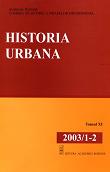Rolul „grecilor” în oraşele Sibiu şi Braşov la sfârşitul secolului al XVIII-lea şi începutul secolului al XIX-lea
The “Greeks” Role in Sibiu and Braşov at the End of the 18th Century and the Beginning of the 19th Century
Author(s): Ruxandra Moaşa NazareSubject(s): History
Published by: Editura Academiei Române
Keywords: Greeks; Sibiu; Braşov; Saxon towns;
Summary/Abstract: The article studies the „Greeks”’ role within the economy and society in Sibiu and Braşov at different comparison levels with the Greek orthodox Diaspora from the Central Europe. Demographically, the members of the Greek trade companies were representing a minority according with the whole population of the two cities. But from the economy point of view they had an important role in the foreign trade by means of the import of the natural products from the Turkish Empire and the export of the manufactured products from The Habsburg Empire. Thus, they provided with the necessary raw materials the guilds and also other industries from The Central Europe and distributed the finite goods of it on the regional market of Transylvania and Romanian Principalities. By their means a part of the goods exchange between the two states and also the transit between Vienna and Istanbul was made, the two economic regions being related by the business and personal relationships between the Greeks and their partners. In the same time they had an important contribution in bringing and trading the products, locally made, into the international market circuit. The commercial activity was completed by land investments – rents, properties, vineyards, beehives, and farms -, and also by implicating the commercial capital into guild production, home industry and manufacturers or money lending. The initiatives in the industry meant sort of pre-capitalist enterprises, which didn’t change essentially the production in a modern way. But, they stimulated the economic growth by means of the goods production development. They also had a contribution in spreading modern economic techniques and behaviours and getting a faster pass from the old to the new forms. Socially, the privileged law status of the Greek companies represented a possibility of social hierarchy climbing for the Romanians in Transylvania, offering in the same time an organizing pattern for the Romanian associations in the field. The Greeks, by means of their preoccupation and interests, represented a component of the Balkans bourgeois society on one hand and of Braşov and Romanian society on the other hand, integrating themselves into the different social levels in different proportions. They established cultural institutions, churches and schools, some of them in partnerships with the Romanians and opened to all the people having the same religion. Gradually, starting from the nucleus represented by the commercial companies, the national Greek community born. The national one replaced the confessional solidarity, the orthodox consciousness lost its importance in the 19th century, and the Romanians and the Greeks separated one from the others from the commercial, religious and educational point of view
Journal: Historia Urbana
- Issue Year: XI/2003
- Issue No: 1+2
- Page Range: 153-168
- Page Count: 16
- Language: Romanian
- Content File-PDF

